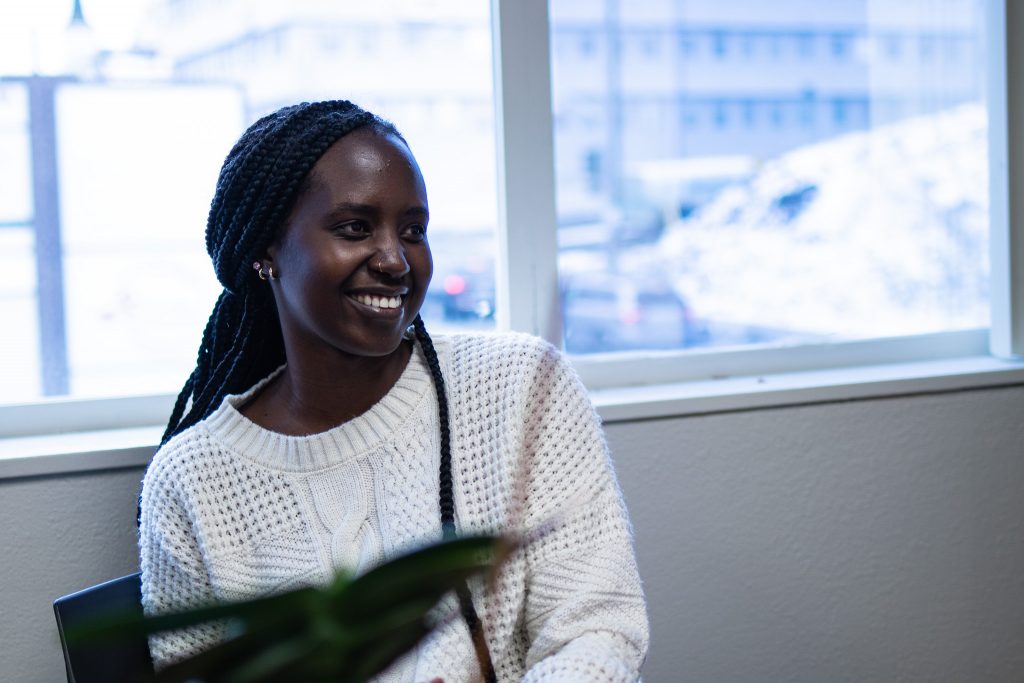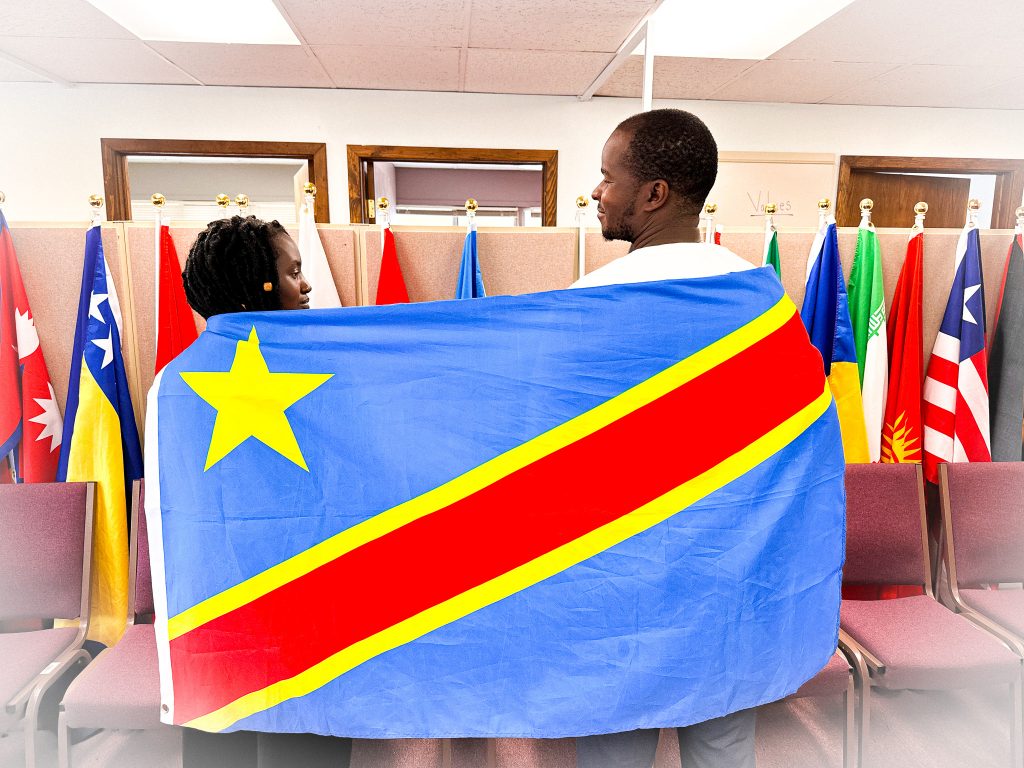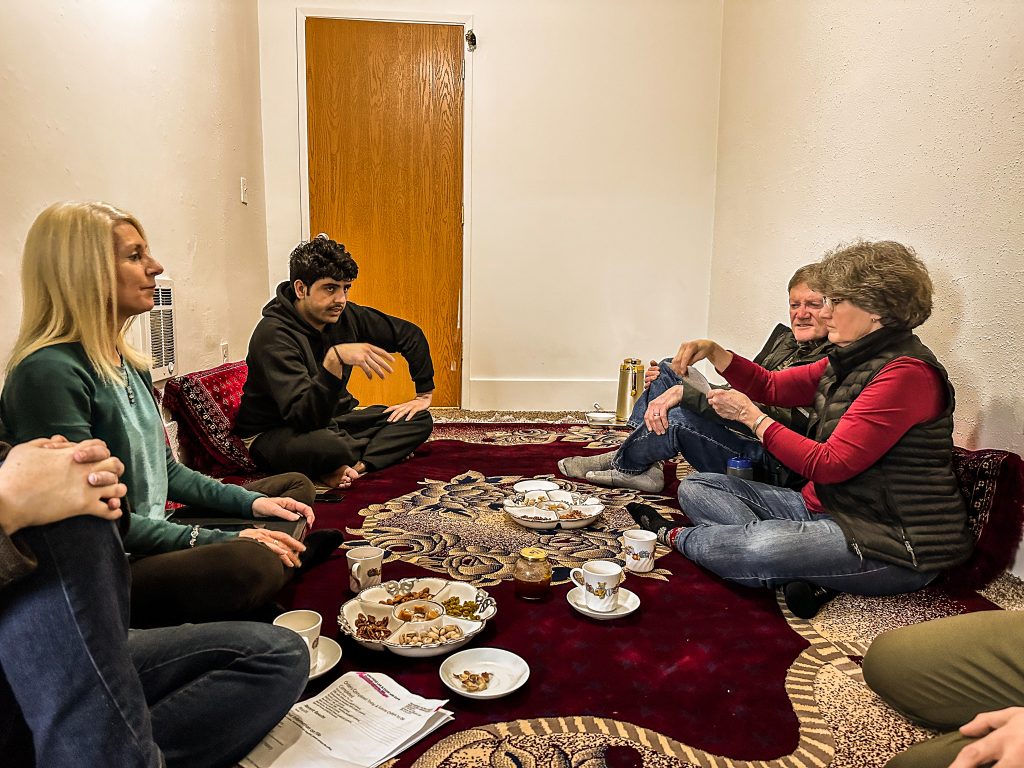Posts by mdallanegra
Jeanine’s Story
By Lisa Zanoni, World Relief Relationship Manager
Editor’s Note: Over the next several months, Lisa will be introducing you to some of our amazing refugee and immigrant friends. Everyone you’ll meet is either a former refugee or a client who received services at World Relief. Lisa is excited to share their stories with you and hopes that you will be both inspired by their resilience and encouraged to know your partnership with World Relief Spokane has made such an impact on their lives.
“They came to our house and took my dad. We heard rumors about what happened to him, but we never really knew the truth.”
When you see Jeanine for the first time, you are struck by her appearance. Tall, poised, and well-dressed, you wouldn’t know by looking at her that her childhood years were filled with seemingly impossible challenges and life-altering, even hopeless circumstances.
As we talked, Jeanine’s internal qualities of perseverance, resilience and determination were revealed, outshining her stunning, external beauty. Born in the Democratic Republic of Congo, Jeanine and her family were forced to flee after her father was abducted from their home and murdered. The decision to leave was a difficult one for her mother. But leave they did, and the place they called home for the next five years was a refugee camp in Rwanda.
Jeanine felt fortunate only to have to live five years in the camp. Her aunt and cousins were already living there and stayed for 12 years. Some of her cousins were born there, and “this was the only life they knew how to live.”
Jeanine is passionate about education, and as she recalls the education system in the camp, her eyes are glistening with tears. “Life was difficult in the camp. There was no way to go to school. Different people wanted to do something to help these children, so that they’re not sitting home all day. My mom started a little school system, and there was no place for us to learn. It was hot there and no rain. We would sit under the trees with no access to water. We had to walk miles to go get water.”
Once the children reached 6th grade, they were able to study outside the camp with other Rwandese children. Upon reaching ninth grade, they were given an exam. If they were lucky and had the scores required for continuing their education, they would qualify for a scholarship to attend a school outside the camp. “But if you don’t have the highest scores, there was no opportunity to go to school.” Paying for education was also an option. Unfortunately, there was no way to earn a viable living inside the camp, and this ultimately meant that most of the children were not able to continue their education. UNICEF and UNHCR would provide materials for learning, but there was no money provided for scholarships.

I asked Jeanine if she felt prepared to enter into the public school system when she arrived in Spokane. Bellowing with laughter, she admitted, “Oh no! I was excited!” She continued, “My whole hope was that I could actually go to school here and have something for myself.”
At the beginning of their journey as refugees, Jeanine and her mother never had any hope or expectation that they would come to America. Their hope was to return home, hoping that their country would be safe enough for them to return. Personal and precious belongings were left behind but not abandoned in their hearts. They never gave up the hope that they would someday return home. Eventually, her mother, “the decision-maker,” made the decision to pursue a life apart from their home in Rwanda. Wanting to provide a life of hope and opportunity for her family, she chose a new life in a new country.
Her mother, a kindergarten teacher and pioneer educator in the camp, instilled in Jeanine a love of learning. Love and respect combined with gratitude and awe for her mother, were catalysts for Jeanine to pursue her education. Not something to be debated, she reflected, “I always hoped to God that if I ever got the opportunity, I would do that. I would keep going. Even with my student loans, I am grateful. God is good. I am thankful I am here in this moment in time.”
In contrast to her early years, Jeanine’s successes since coming to America have been overwhelming. Not only did she and her mother become United States citizens, upon graduating from Ferris High School, Jeanine received her Bachelor’s degree in Communications, and her Master’s degree in Social Work, both from EWU. She has been working alongside us at World Relief Spokane for the past four years, selflessly giving back and lovingly serving refugees. She recently received a promotion and will oversee one of the US programs for World Relief’s headquarters.
As our conversation came to a close, I half-jokingly asked Jeanine if we could plan on seeing “The Jeanine Kayetsi Scholarship Fund” for helping those children remaining in the camps sometime in the near future. Her answer left me feeling challenged. In a positive way. She agreed that a scholarship fund would be great, and she affirmed what we already know in our hearts. Any help would be welcomed for the children in the camps. Funding for education, hygiene products for the girls. “If something magical would happen, maybe I could do that.”
I don’t believe Jeanine needs magic. Jeanine is magic.

Jesus Didn’t Show Favoritism
Rich Versus Poor
During his short time of public ministry, Jesus was busy. Crowds of 5,000 plus gathered to hear him teach. People brought their sick to be healed, even tearing apart roofs to lower the lame at his feet. People pursued him from one shore to another, trying to anticipate where he would go. He only had three years in which to change the world. Surely, it would make sense for him to speak to the most influential people and make the most efficient use of his time. His disciples seemed to think so. They turned away parents seeking to bring their children. The crowds rebuked the blind man who was calling out to Jesus. With so little time, wouldn’t it make sense for Jesus to be selective about the people with whom he engaged?
But that doesn’t appear to be what he did.
Look at the end of Luke chapter 8. A leader in the synagogue – a powerful, influential man – comes to Jesus to say that his daughter of 12 is very ill. Wouldn’t healing this young woman be a way for Jesus to get in good with the religious leaders? Shouldn’t this be his priority?
Jesus agrees to go and begins to make his way there, but along the way, a woman in the crowd, a woman who has been bleeding for 12 years and has exhausted all her resources trying to find help, reaches out to touch him. The text says she had spent all she had with doctors who only made things worse, so she was poor. On top of that, a woman who was bleeding continually would be considered unclean, an outcast. She had nothing to offer Jesus. And, yet, Jesus not only healed her (“he realized that power had gone out from him he wanted to meet her.”) He stopped in the midst of a large crowd and asked, “Who touched me?” Realizing what had happened, she fell at his feet and told him the whole truth. He healed her. He saw her. He listened to her.
After this delay, friends of the synagogue leader, Jairus, come to tell him it’s too late. His daughter has died. But Jesus says, “Don’t be afraid. Just believe.” He tells the mourners at the house to leave, takes the girl by the hand and says to her, “Arise.”
Jesus did not show favoritism to Jairus, the man with power and wealth, but neither does he scorn him. To the outcast woman and to the religious leader, he gives freely and fully of his time and attention.
“You must not show special favor to poor people or great people,
but be fair when you judge your neighbor” ( Lev. 19:15).

From left to right: Janice, Abbas, Blair and Susan sit in the tea room of Abbas’ third floor apartment hosting his new English Conversation Partners. Afghan’s have an uncanny sense of hospitality which they extend to every person who enter their homes.
Enemies & Strangers
In John chapter 4, Jesus has a long conversation with a Samaritan woman. At the time of Jesus, the Israelites hated Samaritans and called them “dogs” or “half-breeds.” The enmity between the two groups was deep and long-standing, dating back to the time of King Rehoboam (Solomon’s son) and the split between the northern kingdom and the southern kingdom. At the time of the split, the northern kingdom ceased to worship in Jerusalem. They built their own temple in the north. After the northern kingdom was conquered by the Assyrians, the Jews and the Assyrians intermarried and many began to worship the Assyrians’ gods alongside the Jewish God.
Later, the people of the southern kingdom were also carried off to Babylon, and when they returned, many Samaritans opposed them. In other words, they had lots of reasons to hate each other. They no longer considered themselves brothers but enemies.
And, yet, Jesus speaks to the Samaritan woman at the well. Again, he sees her, he knows her and he reveals himself to her, so that she might have living water, so that she might become a child of God.
Jesus again breaks down barriers when he tells the story of the Good Samaritan. An expert in the law wanted to test Jesus, and so he asked him, “What must I do to inherit eternal life?” Jesus replies with a question: “What is written in the law?” The man quotes from Deuteronomy and Leviticus: “Love the Lord your God with all your heart and with all your soul and with all your strength and with all your mind’; and, ‘Love your neighbor as yourself.’”
Jesus says he has answered well. This is true, but then the man asks, “Who is my neighbor?” The Bible says the man wanted to justify himself. He wanted to find a loophole or a rationale that would make him look good.
Jesus then tells the story of the Good Samaritan. His audience would have been expecting a Jew to be the hero of the story, rescuing the man who was beaten and left to die, but much to their consternation, Jesus makes a Samaritan the hero of the story.
At the end of the story, Jesus asks, “Which of these three do you think was a neighbor to the man who fell into the hands of robbers?’
And the man replies, “The one who had mercy on him.”
Jesus told him, “Go and do likewise.”
Questions to ponder:
- Are you more likely to show favoritism to the rich or to the poor?
- Who might Jesus use as the hero of the story in the Good Samaritan today?
World Relief Spokane Applauds Creation of the Welcome Corps, A New Refugee Private Sponsorship Program
CONTACT:
Barbara Comito
bcomito@wr.org
Pinkston Team
wr@pinkston.co
Media welcome: Monday, January 30 at 5 p.m. World Relief Spokane will hold an informational meeting on the Biden Administration’s new Welcome Corps at 1522 N Washington Street. Come learn more about this new program, what it means for refugees and other newcomers, what it means for community members, and how World Relief Spokane plans to support the effort.
This week the State Department launched the Welcome Corps, a new refugee private sponsorship program that will allow everyday Americans to privately sponsor refugees coming to the United States. This new program will expand community support for refugees and also eventually allow private citizens to sponsor refugees they identify abroad to be resettled to the United States. World Relief Spokane applauds this effort and is eager to partner with the U.S. government and the Spokane community to welcome refugees, both through our own refugee resettlement program and the new private sponsorship program.
The Welcome Corps has a goal to mobilize at least 10,000 Americans to partner with members of their communities to help refugees secure initial housing in the U.S., greet them at the airport, enroll children in school, and help adults to find employment. World Relief is committed to assisting the Welcome Corps reach that goal.
“The Spokane community is an extremely welcoming community,” said Executive Director Christi Armstrong. “Over the course of the past 30 years, World Relief Spokane has resettled more than 11,000 men, women and children. We eagerly endorse all the ways the community partners with us to make this a safe home for people fleeing violence and persecution.”
Through the Welcome Corps, groups of at least five individual American citizens or permanent resident adults are able to apply to privately sponsor refugees resettling to the United States. Private sponsors are responsible for independently raising funds to support refugees for their first 90 days in their new community, as well as helping refugees find housing, employment, and connecting them to community services.
For more information on the Welcome Corps, please attend the informational meeting on Monday, January 30, 5 p.m., at World Relief Spokane, 1522 N Washington Street. You can also find a wealth of information on the Welcome Corps website. Further information and education is also available on the World Relief website. We encourage churches, individuals, and other community organizations to explore these resources for more information and reach out with any questions or concerns.





